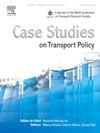Contested power structures in global logistics networks: Insights from the 2023 truck driver protests in Germany
IF 3.3
Q3 TRANSPORTATION
引用次数: 0
Abstract
The concept of labour agency has so far lacked an approach that comprehensively integrates both the structural conditions and outcomes of labour actions – for example, institutional frameworks in global supply chains, which are currently undergoing rapid change. By combining the concept of labour agency with the global production networks (GPN) approach and using the case of the 2023 truck driver protests in Gräfenhausen, Germany, the paper addresses the existing gap and examines the extent to which labour actions can alter power structures within global logistics networks. The study draws on a qualitative approach, in which primarily interviews have been conducted with various actors involved in logistics networks. The findings show that the protests in Gräfenhausen contested existing power structures in global production networks through the utilisation of both collective as well as institutional power. However, they neither resulted in the formation of new nor a mere maintenance of existing structures. Instead, the results indicate that labour actions in the case of Gräfenhausen led to a recalibration, specifically a behavioural adjustment among actors within global logistics networks. The study demonstrates that labour actions can yield multi-layered and even contradictory effects on their broader structural context. Thus, the paper argues for a nuanced understanding of labour agency outcomes and structure-agency dynamics in global production networks.
全球物流网络中有争议的权力结构:来自2023年德国卡车司机抗议的见解
迄今为止,劳工中介的概念缺乏一种全面整合劳工行动的结构条件和结果的方法-例如,目前正在经历快速变化的全球供应链中的制度框架。通过将劳工中介的概念与全球生产网络(GPN)方法相结合,并使用2023年德国Gräfenhausen卡车司机抗议的案例,本文解决了现有的差距,并检查了劳工行动在多大程度上可以改变全球物流网络中的权力结构。该研究采用了定性方法,主要采访了参与物流网络的各种行动者。研究结果表明,Gräfenhausen的抗议活动通过集体和机构权力的利用,对全球生产网络中现有的权力结构提出了质疑。然而,它们既没有形成新的结构,也没有仅仅维持现有的结构。相反,结果表明,在Gräfenhausen的情况下,劳工行动导致了重新校准,特别是全球物流网络中行动者之间的行为调整。该研究表明,劳工行为可以在其更广泛的结构背景下产生多层次甚至相互矛盾的影响。因此,本文主张对全球生产网络中的劳动代理结果和结构-代理动态进行细致的理解。
本文章由计算机程序翻译,如有差异,请以英文原文为准。
求助全文
约1分钟内获得全文
求助全文

 求助内容:
求助内容: 应助结果提醒方式:
应助结果提醒方式:


